Chorus girls – and boys
November 18, 2015
Lynn Fotheringham tells us about the creative challenges and opportunities of the Chorus. In the Horrible Histories Groovy Greeks[1] theatre-show, a family of supposedly late-arriving theatre-goers are sucked into the action to learn about ancient Greek culture. They are informed that the Greeks had democracy, the Olympics and theatre: that the actors (all male) wore masks, …
Coming Soon: Theatre with a Classical Connection…
January 7, 2015
Lynn Fotheringham has been searching out theatrical productions with a classical connection over the next few months, in Nottingham, nearby cities and London. Sheffield, 13th February only, 13.00: Phaedra’s Love, semi-staged reading as part of a season of the complete works of Sarah Kane, whose reputation for writing plays with lots of on-stage violence suggests …
On (Not) Spoiling the Medea
November 29, 2014
Lynn Fotheringham reflects on the National Theatre’s recent production of Medea. In 2007 there was a new film-adaptation of Richard Matheson’s 1954 novel, I am Legend. Two previousversions had failed to justice to the original twist-ending, which chillingly inverts the roles of the vampires/zombies and their hunter. I knew in my heart of hearts that …
The Power of (Moving) Pictures
November 23, 2014
Esther Eidinow reports on the first seminar of the Teaching and Learning Ancient Religion Network (TLAR), and the power of Panoply… Sonya Nevin is working magic. It’s a cold, wet evening, and 15 people, seated around a table in a room in Senate House, London (kindly sponsored by the ICS), are staring up at a …
We have two blog entries today, both from doctoral students in Classics: in the first, Peter Davies, reflects on the legacy of the poet Simonides’ words in commemorating the fallen…
November 11, 2014
After the battle of Thermopylae – immortalised by Herodotus and, in our own time, given new fame by Snyder’s epic 300 – the Lyric poet Simonides wrote an encomium for the Greek dead. In 1838 John Sterling would translate some of his words thus: Of those who at Thermopylae were slain, Glorious the doom, and …
Enjoying Receptions of Athenian Tragedy
November 2, 2014
Larissa Ransom, who is studying for an MA in Classical Literature, has recently seen Pilot Theatre’s Antigone, National Theatre Live’s Medea and Broadway Theatre Archive’s Antigone. Here she muses on how this has changed her thinking about Greek tragedy… It is commonly believed that much of a book is lost when turned into a …
Tig, You’re It
October 17, 2014
Lynn Fotheringham, Director of the Centre for Ancient Drama and its Reception (based in the Classics Dept at Nottingham University), reviews Pilot Theatre’s current production of Antigone. Pilot Theatre’s production of Sophocles’ Antigone (in a new version by Roy Williams) came to the Lakeside in the same week that we were covering screen-versions of Greek …
A Herculean Achievement: The Twelve Labours of… Vladimir Putin
October 12, 2014
Esther Eidinow reports on an intriguing use of ancient Greek myth… Herakles, Hercules, Melqart… Putin: a celebration of the Russian leader’s achievements put Greek myth back on the map last week. An exhibition of pictures, organised by a Facebook group of Putin’s supporters, showed the President engaged in Herakles’ different tasks—each repurposed to represent a …
The Spirit and the Argonauts Myth
September 28, 2014
Helen Lovatt finds some surprising references to classical Greek myth in The Spirit, a recent film by Frank Miller (author of 300)… When I sat down to watch a film the other night, I was happily anticipating a complete break from work. But perhaps it should not surprise me to find The Spirit (2008), directed …
Greek for the Globe
September 21, 2014
Requests for translation into ancient Greek are understandably rare. But one was passed on to Oliver Thomas recently from a friend-of-a-friend at the Globe Theatre. For their production of Julius Caesar the Globe’s creative team wanted to mark the three main deaths (those of Caesar, Brutus and Cassius) by adding a small female chorus of …

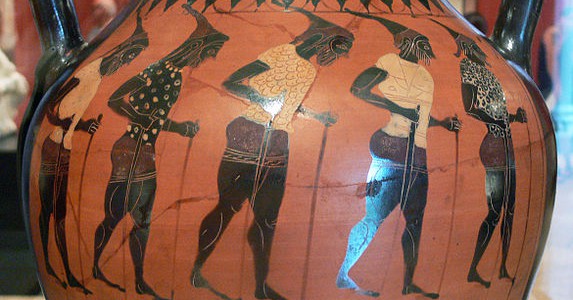
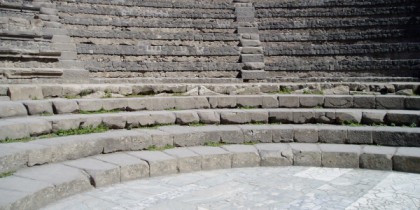
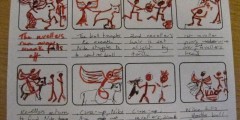

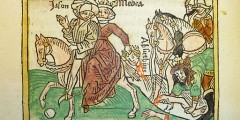

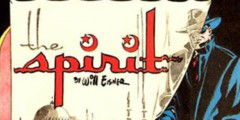
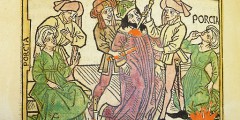
Recent Comments